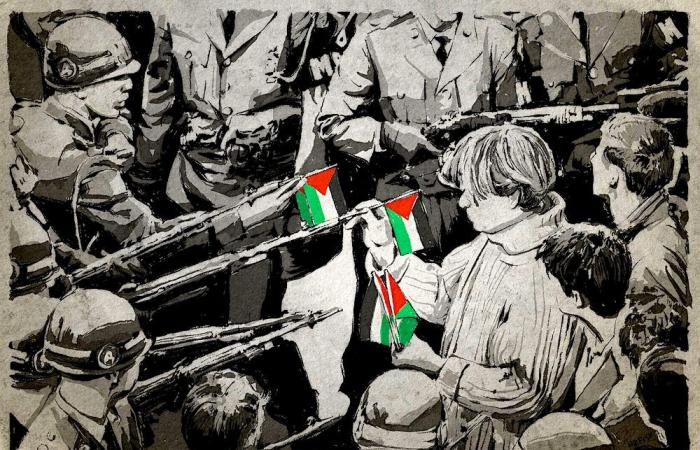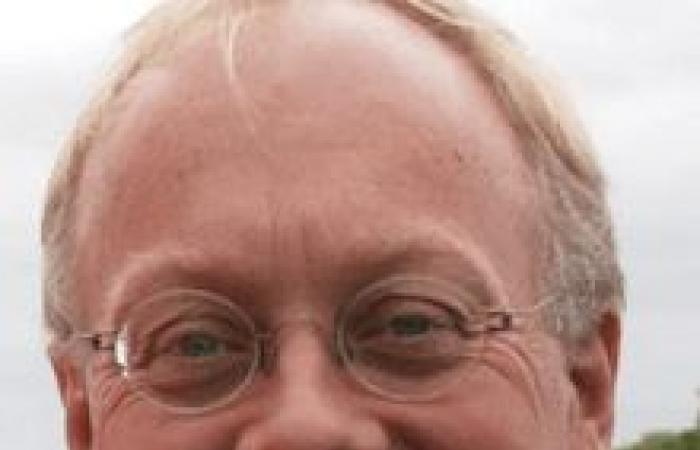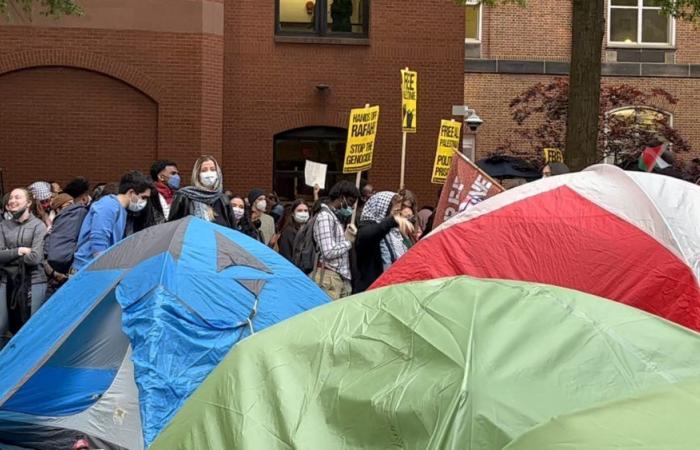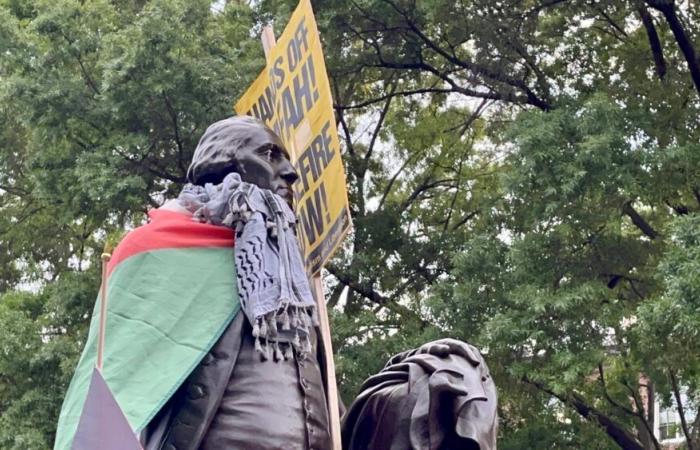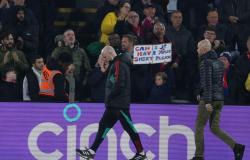University students across the country, facing mass arrests, suspensions, expulsions and expulsions, are our last, best hope to stop the genocide in Gaza.
One chinthya Sivalingam, a graduate student in Public Affairs at Princeton University, did not know when she woke up this morning that just after 7 a.m. she would be among hundreds of students across the country who have been arrested, expelled and banned from campus for protesting the genocide in Gaza.
She wears a blue sweater, sometimes she fights back tears when I talk to her. We are sitting at a small table in the Small World Coffee Shop on Witherspoon Street, half a block away from the university she can no longer get into, from the apartment she can no longer live in and from the campus where she would have graduated in a few weeks.
She wonders where she will spend the night.
The police gave her five minutes to retrieve items from her apartment.
“I took very random things,” she says. “I took oatmeal for some reason. I was really confused”.
Student protesters across the country are showing a moral and physical courage—many facing suspension and expulsion—that puts any major institution in the country to shame. They are dangerous not because they disrupt campus life or engage in attacks on Jewish students—many of those protesting are Jewish—but because they expose the abject failure of the ruling elites and their institutions to stop genocidal crimes.
These students are watching, like most of us, Israel’s live slaughter of the Palestinian people. But unlike most of us, they act. Their voices and protests are a powerful counterpoint to the moral bankruptcy that surrounds them.
Not one university president has condemned Israel’s destruction of all universities in Gaza. Not one university chancellor has asked for an immediate and unconditional ceasefire. Not one university chancellor has used the words “apartheid” or “genocide”. Not one university chancellor has called for sanctions and a boycott of Israel.
Instead, the leaders of these academic institutions fall to their knees before wealthy donors, corporations—including arms manufacturers—and rabid right-wing politicians. They reframe the debate to be about harm to Jews instead of the daily slaughter of Palestinians, including thousands of children.
They have allowed the aggressors – the Zionist state and its supporters – to present themselves as victims. This false narrative, which focuses on anti-Semitism, allows the centers of power, including the media, to block the real issue – genocide. It pollutes the debate. It is a classic case of “reactive abuse”. Raise your voice to denounce injustice, react to prolonged abuse, try to resist, and the abuser suddenly turns into the victim.
Princeton University, like other universities across the country, is determined to stop camps demanding an end to the genocide. This, it seems, is a coordinated effort by universities across the country.
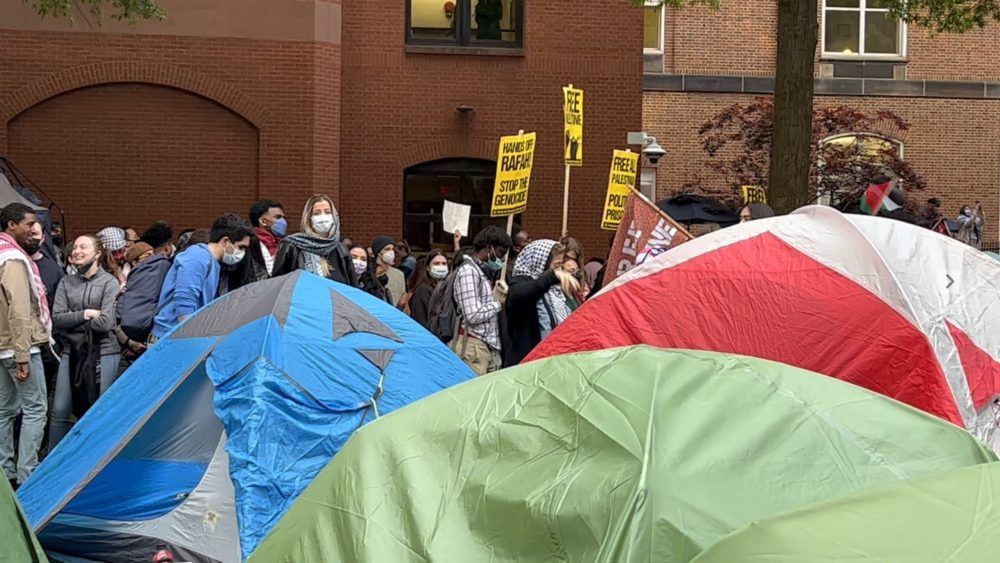
The university knew about the proposed camp in advance. When the students reached the five staging areas this morning, they were greeted by large numbers from the university’s Department of Public Safety and the Princeton Police Department.
The area of the proposed camp in front of the Firestone Library was filled with police. This despite the fact that the students kept their plans away from the university’s emails and limited to what they thought were secure apps. Standing among the police this morning was Rabbi Eitan Webb, who founded and directs Princeton’s Chabad House. He has attended university events to attack those calling for an end to the genocide as anti-Semites, according to student activists.
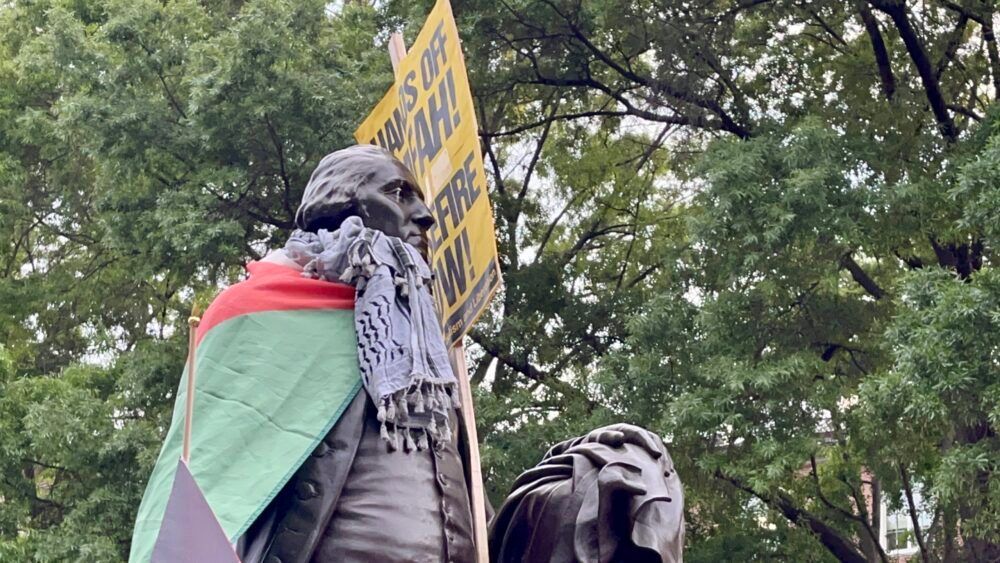
A threat
Princeton Vice President for Campus Life Rochelle Calhoun sent out a mass email Wednesday warning students that they could be arrested and kicked off campus if they set up camp.
“Any person engaged in an encampment, occupation or other illegal disruptive behavior who refuses to stop after a warning will be arrested and immediately banned from campus,” she wrote. “For students, such an exclusion from campus will jeopardize their ability to complete the semester.”
Those students, she added, could be suspended or expelled.
Sivalingam met one of his professors and pleaded with him for the faculty’s support for the protest. He informed her that he was on his way to class and could not attend. The course he teaches is called “ecological Marxism”.
It was a strange moment, she says. “I spent last semester thinking about ideas and evolution and civil change, like social change. It was a crazy moment.”
She begins to cry.
A few minutes after 7:00 a.m., the police handed out a leaflet to the students who were erecting tents with the heading “Princeton University Warning and No Trespass Notice”. The brochure stated that the students were “engaged in conduct on Princeton University property that violates University rules and regulations, poses a threat to the safety and property of others, and disrupts the normal operations of the University: such conduct includes participating in a camp and/or disrupting a university event.” The pamphlet said those who engaged in the “prohibited conduct” would be considered a “defiant trespasser under the New Jersey Penal Code (NJSA 2C:18-3) and subject to immediate arrest.”
A few seconds later, Sivalingam heard a policeman say, “Take those two.”
Hassan Sayed, a graduate student in economics who is of Pakistani descent, worked with Sivalingam to erect one of the tents. He was handcuffed. Sivalingam was tied with strips so tightly that it blocked circulation to her hands. There are dark bruises around her wrists.
It was a first warning from the police about ‘You are committing an offence’ or something like that, ‘This is your first warning’, Sayed says. “It was a bit loud. I didn’t hear too much. Suddenly, hands were forced behind my back. When this happened, my right arm tightened a little and they said ‘You are resisting arrest if you do that.’ They put the handcuffs on.”
He was asked by one of the arresting officers if he was a student. When he said he was, they immediately informed him that he was banned from campus.
“No mention of what the charges are as far as I could hear,” he says. “I’m being taken to a car. They pat me down a little. They are asking for my student ID.”
BREAKING: IVY LEAGUE PRINCETON UNIVERSITY STARTS AN ENCAMPMENT FOR GAZA
The police quickly stormed the scene and arrested dozens of students.
The oppression of the establishment continues. Israel controlled. pic.twitter.com/OgYxapif8Y
— Sulaiman Ahmed (@ShaykhSulaiman) https://twitter.com/ShaykhSulaiman/status/1783580614437871631?ref_src=twsrc%5Etfw
Sayed was placed in the back of a campus police car along with Sivalingam, who was bothered by the strips. He asked police to untie them on Sivalingam, a process that took several minutes as they had to remove her from the vehicle and the scissors failed to cut through the plastic. They had to find wire cutters. They were taken to the university’s police station.
Sayed was stripped of his phone, keys, clothes, backpack and AirPods and placed in a waiting cell. No one read him his Miranda rights.
He was again told he was banned from campus.
“Is this an eviction”? he asked the campus police.
The police did not respond.
He asked to call a lawyer. He was told that he could call a lawyer when the police were ready.
“They may have mentioned something about trespassing, but I don’t remember clearly,” he says. “It was certainly not made known to me.”
He was told to fill in forms about his mental health and whether he was taking medication. Then he was informed that he was charged with “defiant trespass”.
“I say, ‘I’m a student, what about trespassing? I go to school here, he says. “They don’t seem to have a good answer. I repeat and ask if being banned from campus constitutes eviction, because I live on campus. They just say, “expulsion from campus.” I said something like that doesn’t answer the question. They say it will all be explained in the letter. I think: “Who is writing the letter”? “Dean of the school,” they answer.
Sayed was driven to his campus house. Campus police wouldn’t let him have the keys. He was given a few minutes to get things like the phone charger. They locked the door to his apartment. He too seeks shelter in the Small World Coffee Shop.
Sivalingam often returned to Tamil Nadu in southern India, where she was born, for her summer vacations. The poverty and the daily struggle of those around her to survive, she says, provided a “reminder”.
“The disparities between my life and yours, how do you reconcile how these things exist in the same world,” she says, her voice quivering with emotion. “It’s always been very strange to me. I think this is where much of my interest in standing against inequality, in being able to think of people outside the United States as people, as people who deserve life and dignity, comes from.”
She must prepare to be kicked off campus.
“I need to find a place to sleep,” she says, “tell my parents, but it’s going to be quite a conversation, and find ways to engage in prison support and communication because I can’t be there, but I can carry on to mobilize”.
There are many shameful periods in American history. The genocide we committed against indigenous people. Slavery. The violent suppression of the labor movement in which hundreds of workers were killed. Lynching. Jim and Jane Crow. Vietnam. Iraq. Afghanistan. Libya.
The genocide in Gaza, which we fund and support, is of such monstrous proportions that it will achieve a prominent place in this pantheon of crimes.
History will not be kind to most of us. But it will bless and honor these students.
This article was published by The Chris Hedges Report:
Revolt in the Universities
Tags: Chris Hedges Uprising universities
-
